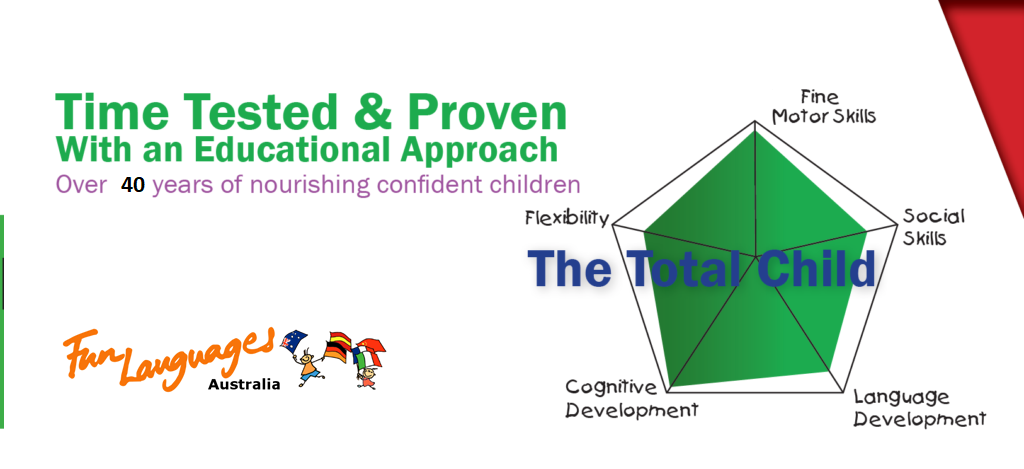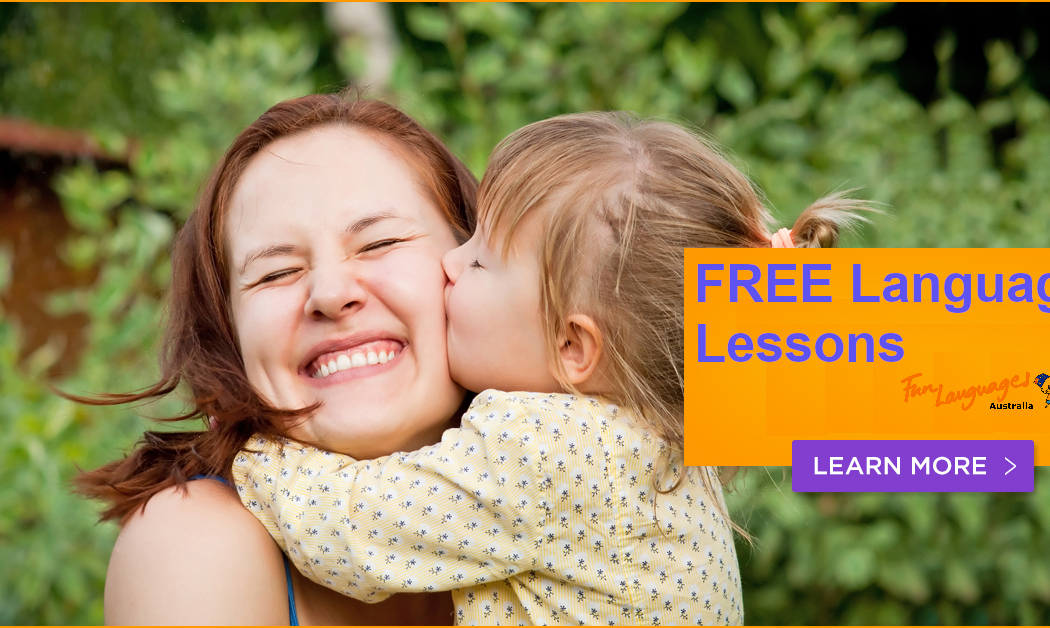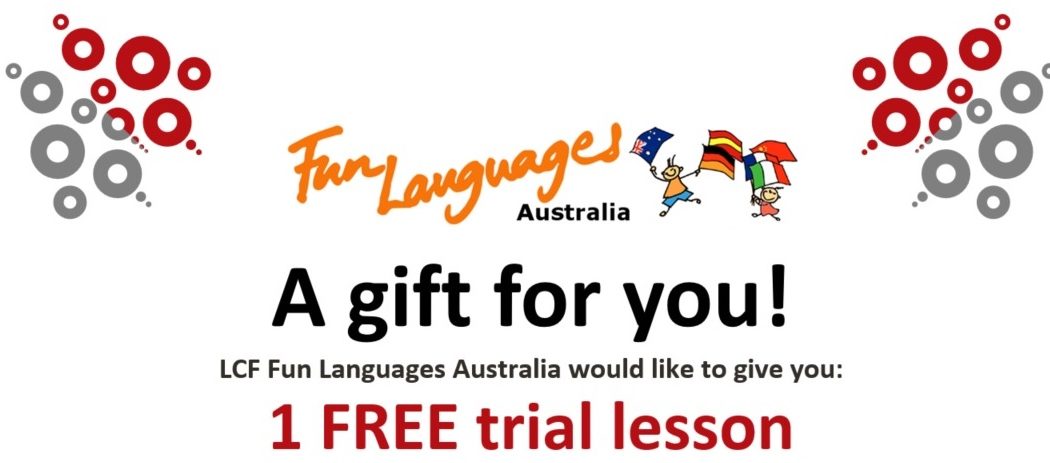-

2 Free lessons when a childcare/Montessori/daycare signs up with us for a term. T&C apply. *Only available at participating locations. The promotion ends on 28/02/2020. Contact us today!
Enquiry From Childcare Centers
In this global economy parents no longer have the luxury of asking themselves “should my child learn a second language”, the question they should be asking themselves is “when should I introduce the second language and what should that language be?”
“One language sets you in a corridor for life. Two languages open every door along the way – Frank Smith”
In fact across the world more and more children are learning a second language at home, and the art of learning this language is simply a part of growing up.We know that introducing a second language to children makes them better thinkers, more effective communicators and, more importantly, makes them global citizens. LCF Fun Language has been educating children across the world for over 40 years. When it comes to teaching a language LCF uses implicit and explicit teaching methods to make the learning fun!
If, like many parents, who are busy parent wondering when to find the time to introduce another activity, LCF, in partnership with Childcare Providers bring language learning to the centres allowing your child to learn with their friends in a space they are comfortable and confident in.
If you would like any further information, please visit our website https://lcfclubs.com.au/childcare
-
-
Enrol and WIN an Xbox One S
T&C
- Enrol in a language club using our website (www.lcfclubs.com.au) and write “What they like about LCF language program?” in “Order notes” section? “Order note” section shows up where parents enter their address during enrollment.
- Parents from participating childcare centres, and parents paying by PayPal subscription or direct bank transfer can enter the competition by posting on our Facebook competition post (https://www.facebook.com/LCFFunLanguages/photos/gm.1057260577996064/10157285335525675/?type=1&theater) with the following information: which childcare/club their child goes to, and “What they like about LCF language program?”
- Parents agree to use their comments and name for LCF promotions.
- Competition closing date 30/06/2020
- You can also participate by writing a review in Google. Click the link for more information.
-
-
In the last six or seven years, the Australian Government has been pushing towards introducing a second language into schools. […]
-
Recent advances in neuroscience have led to an increased appreciation of the effects of early experience on the brain, with ramifications for language, cognitive, and social-emotional development.1,2 Language development has been especially well studied, with extensive research documenting relations between early exposure to adult language and children’s language capacities through early elementary school.3–6
The authors of “Language Experience in the Second Year of Life Predicts Language Outcomes in Late Childhood” extend existing research by using a naturalistic methodology based on analysis of full-day audio recordings (Language ENvironment Analysis, LENA) to demonstrate long-term associations between early language exposure and subsequent child language and IQ through late middle school.7 Gilkerson et al7 found that the strongest predictor was language-based interaction, with relations (less robust) also found for quantity of language exposure. By showing that parent-child verbal interactions in early childhood predict critically important outcomes through age 14 years (∼10 years later), the authors of this study have made a major contribution to this topic, with strong implications for American Academy of Pediatrics policy and clinical practice recommendations.8–10With these findings, the authors also add to the preponderance of research in which the importance of supporting families toward common goals of developmental progress and educational achievement is demonstrated.6,11,12
The early environment influences every aspect of child development; in addition to effects on cognitive and language outcomes, recent work has also shown that parent-child verbal interactions also have effects on social-emotional development.13 This speaks to the importance of early language exposure in every domain of early learning and also to the agency with which children elicit stimulation from their caregivers and their environment; children learn through interactions but also use language to elicit and extend the interactions which help them learn. Like language skills, social-emotional skills and self-regulation play vital roles in early learning and school success.14,15
The authors speak strongly to the importance of interaction during the 18- to 24-month period of “language explosion”; findings suggest that programs seeking to foster language skills in young children should pay careful attention to the context in which young children are exposed to language during this crucial period. Promotion of language-rich and emotionally positive interactions should be the goal, with play and reading aloud offering contexts for parents to provide not only enriched vocabulary but also opportunities and prompts for enriched interactions.16–19 In particular, study findings support “primary prevention” of disparities in development and school readiness, beginning early in life before their onset. This is a fundamentally different approach than that of treatment initiatives, which, although also essential, are designed to address problems after their emergence. Importantly, primary prevention can be used to provide an opportunity for population-level delivery across the socioeconomic spectrum, with potential for low cost and cascading impacts across the life span.20
Because primary care visits and immunizations are especially frequent in the first 2 years of life, a period in which children are not necessarily enrolled in other programs or institution-based care, pediatric primary health care offers a promising and low-cost platform for universal, population-level prevention through relationship- and strengths-based strategies.20 The Reach Out and Read (ROR) program, in which primary care providers offer anticipatory guidance about and modeling of reading aloud (along with developmentally appropriate children’s books) at health supervision visits from birth to 5, is the most established scaled program, reaching 4.7 million children annually.21 ROR emphasizes dialogic reading techniques in provider training and in parent materials, using the books to foster language-rich interactions. Families receiving ROR report more frequent reading with their children and more positive attitudes toward reading aloud, and children in the intervention have shown improved vocabularies.22,23
A number of other primary prevention initiatives use pediatric primary care to support language interactions through shared book reading and interactive and pretend play. One well-studied example is the Video Interaction Project (VIP), which enhances ROR by adding a parenting coach at each primary care visit who briefly video records parents and children engaging together around a book or toy provided by the program and then immediately reviews the video with the family.24 Positive, sustained impacts of the VIP on relational health broadly and in child development have been shown in studies.25,26 Additional examples include Healthy Steps,27 Thirty Million Words,28 Bridging the Word Gap,29Smart Beginnings (links the VIP in primary care to home visiting through Family Check Up),30 Sit Down and Play,31 and City’s First Readers (links to community partners, eg, libraries).32
In the study by Gilkerson et al,7 it is shown that patterns of language exposure established early in life are associated with trajectories of child language and IQ through late middle school. These findings are especially remarkable given the heterogeneity of children’s experiences as they grow up. The importance of language-based interactions for developmental outcomes across many important domains adds weight to the urgency of universal primary prevention programs, which will help parents establish positive patterns during the crucial early developmental windows.
Footnotes
-
- Accepted July 20, 2018.
- Address correspondence to Alan L. Mendelsohn, MD, Division of Developmental-Behavioral Pediatrics, Department of Pediatrics, New York University School of Medicine, Bellevue Hospital Center, 550 First Ave, OBV, Room A519, New York, NY 10016. E-mail: alan.mendelsohn@nyumc.org
-
Opinions expressed in these commentaries are those of the authors and not necessarily those of the American Academy of Pediatrics or its Committees.
-
FINANCIAL DISCLOSURE: The authors have indicated they have no financial relationships relevant to this article to disclose.
-
FUNDING: NIH grant R01 HD076390. Funded by the National Institutes of Health (NIH).
-
POTENTIAL CONFLICT OF INTEREST: Dr Klass is national medical director of Reach Out and Read (no financial compensation). Dr Mendelsohn is the principal investigator of studies of Reach Out and Read and the Video Interaction Project (no financial compensation).
-
COMPANION PAPER: A companion to this article can be found online at www.pediatrics.org/cgi/doi/10.1542/peds.2017-4276.
References
- ↵
http://pediatrics.aappublications.org/content/early/2018/09/06/peds.2018-2234 by ,
-
-
-
A gift for you!
LCF Fun Languages Australia would like to give you:
1 FREE trial lesson
Redeemable at any time during 2018.
Contact us to start a new club at your school or childcare!
1300 707 288
-
In the last six or seven years, the Australian Government has been pushing towards introducing a second language into schools. While some schools have managed to integrate language into the curriculum, many schools have not been able to introduce it as efficiently and effectively as they would have liked to.
In this global economy parents no longer have the luxury of asking themselves “should my child learn a second language”, the question they should be asking themselves is “when should I introduce the second language and what should that language be?”







